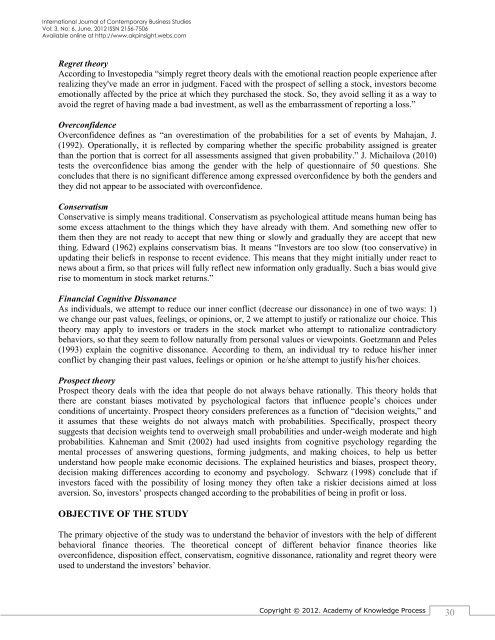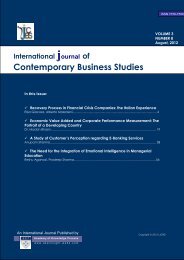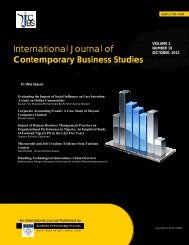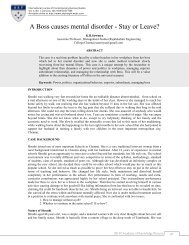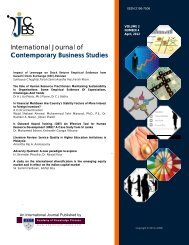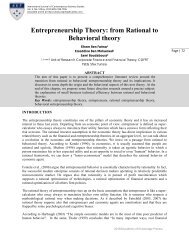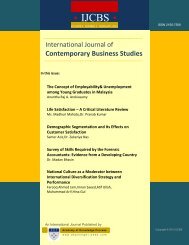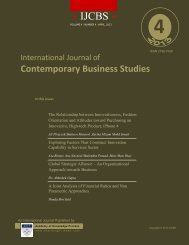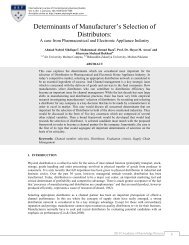International journal of Contemporary Business Studies
International journal of Contemporary Business Studies
International journal of Contemporary Business Studies
You also want an ePaper? Increase the reach of your titles
YUMPU automatically turns print PDFs into web optimized ePapers that Google loves.
<strong>International</strong> Journal <strong>of</strong> <strong>Contemporary</strong> <strong>Business</strong> <strong>Studies</strong><br />
Vol: 3, No: 6. June, 2012 ISSN 2156-7506<br />
Available online at http://www.akpinsight.webs.com<br />
Regret theory<br />
According to Investopedia “simply regret theory deals with the emotional reaction people experience after<br />
realizing they've made an error in judgment. Faced with the prospect <strong>of</strong> selling a stock, investors become<br />
emotionally affected by the price at which they purchased the stock. So, they avoid selling it as a way to<br />
avoid the regret <strong>of</strong> having made a bad investment, as well as the embarrassment <strong>of</strong> reporting a loss.”<br />
Overconfidence<br />
Overconfidence defines as “an overestimation <strong>of</strong> the probabilities for a set <strong>of</strong> events by Mahajan, J.<br />
(1992). Operationally, it is reflected by comparing whether the specific probability assigned is greater<br />
than the portion that is correct for all assessments assigned that given probability.” J. Michailova (2010)<br />
tests the overconfidence bias among the gender with the help <strong>of</strong> questionnaire <strong>of</strong> 50 questions. She<br />
concludes that there is no significant difference among expressed overconfidence by both the genders and<br />
they did not appear to be associated with overconfidence.<br />
Conservatism<br />
Conservative is simply means traditional. Conservatism as psychological attitude means human being has<br />
some excess attachment to the things which they have already with them. And something new <strong>of</strong>fer to<br />
them then they are not ready to accept that new thing or slowly and gradually they are accept that new<br />
thing. Edward (1962) explains conservatism bias. It means “Investors are too slow (too conservative) in<br />
updating their beliefs in response to recent evidence. This means that they might initially under react to<br />
news about a firm, so that prices will fully reflect new information only gradually. Such a bias would give<br />
rise to momentum in stock market returns.”<br />
Financial Cognitive Dissonance<br />
As individuals, we attempt to reduce our inner conflict (decrease our dissonance) in one <strong>of</strong> two ways: 1)<br />
we change our past values, feelings, or opinions, or, 2 we attempt to justify or rationalize our choice. This<br />
theory may apply to investors or traders in the stock market who attempt to rationalize contradictory<br />
behaviors, so that they seem to follow naturally from personal values or viewpoints. Goetzmann and Peles<br />
(1993) explain the cognitive dissonance. According to them, an individual try to reduce his/her inner<br />
conflict by changing their past values, feelings or opinion or he/she attempt to justify his/her choices.<br />
Prospect theory<br />
Prospect theory deals with the idea that people do not always behave rationally. This theory holds that<br />
there are constant biases motivated by psychological factors that influence people‟s choices under<br />
conditions <strong>of</strong> uncertainty. Prospect theory considers preferences as a function <strong>of</strong> “decision weights,” and<br />
it assumes that these weights do not always match with probabilities. Specifically, prospect theory<br />
suggests that decision weights tend to overweigh small probabilities and under-weigh moderate and high<br />
probabilities. Kahneman and Smit (2002) had used insights from cognitive psychology regarding the<br />
mental processes <strong>of</strong> answering questions, forming judgments, and making choices, to help us better<br />
understand how people make economic decisions. The explained heuristics and biases, prospect theory,<br />
decision making differences according to economy and psychology. Schwarz (1998) conclude that if<br />
investors faced with the possibility <strong>of</strong> losing money they <strong>of</strong>ten take a riskier decisions aimed at loss<br />
aversion. So, investors‟ prospects changed according to the probabilities <strong>of</strong> being in pr<strong>of</strong>it or loss.<br />
OBJECTIVE OF THE STUDY<br />
The primary objective <strong>of</strong> the study was to understand the behavior <strong>of</strong> investors with the help <strong>of</strong> different<br />
behavioral finance theories. The theoretical concept <strong>of</strong> different behavior finance theories like<br />
overconfidence, disposition effect, conservatism, cognitive dissonance, rationality and regret theory were<br />
used to understand the investors‟ behavior.<br />
Copyright © 2012. Academy <strong>of</strong> Knowledge Process<br />
30


